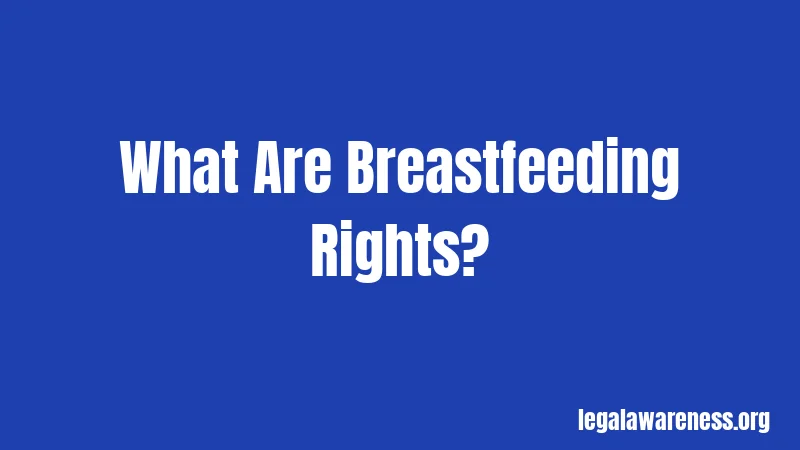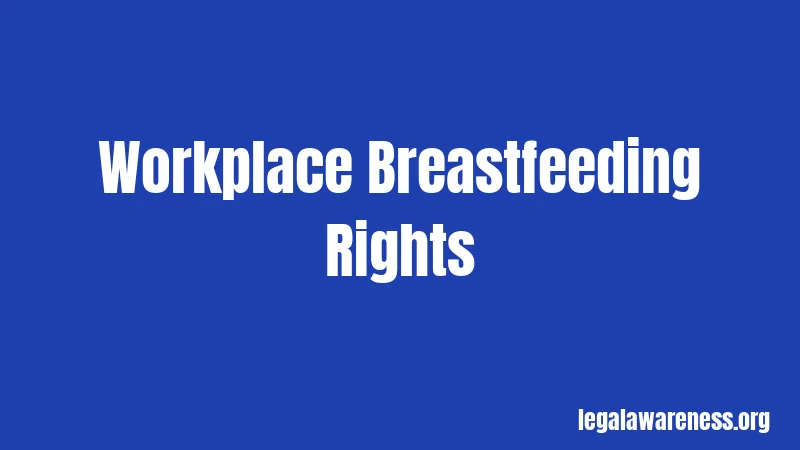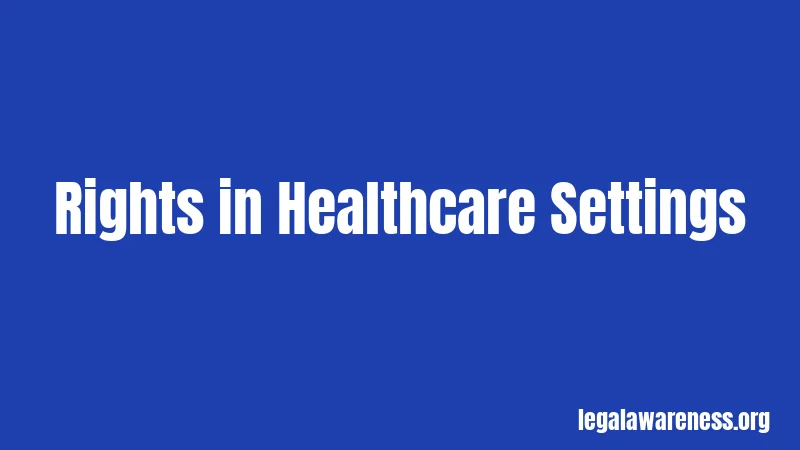Breastfeeding Laws in New York (2026): Rights Every Parent Should Know
Most people don’t realize just how strong breastfeeding protections are in New York. Seriously. This state was actually the first in the entire country to pass a civil rights law protecting nursing mothers. That was way back in 1994. Now, over 30 years later, New York has some of the strongest breastfeeding protections anywhere.
Whether you’re planning to nurse in public or pump at work, you’ve got serious legal protections. Let’s break down exactly what your rights are and what employers must do by law.
What Are Breastfeeding Rights?

Breastfeeding rights protect parents who feed their babies. These laws cover nursing in public places and pumping at work. They also protect you from discrimination.
New York takes these rights seriously. You can breastfeed anywhere you’re legally allowed to be. Parks, restaurants, stores, doctor’s offices. Anywhere. Nobody can tell you to leave or ask you to cover up.
At work, things are even more detailed now. Your employer must give you paid breaks to pump. They must provide a private space that’s not a bathroom. And they can’t treat you differently because you’re breastfeeding.
Pretty straightforward, right?
Your Rights in Public Places
Here’s the deal. You can breastfeed your child in any public or private location where you’re allowed to be. This comes from New York Civil Rights Law Section 79-e.
The law says you can nurse whether or not your nipple is covered. Read that again. The law specifically protects you even if your breast is exposed while feeding. This protection is built right into civil rights law.
Nobody can ask you to leave a restaurant, store, or park for breastfeeding. They can’t tell you to go to a bathroom. They can’t ask you to cover up with a blanket. If someone tries this, they’re violating your rights.
Not Considered Indecent Exposure
Wondering if breastfeeding counts as public indecency? It doesn’t.
New York Penal Law Section 245.01 specifically exempts breastfeeding from indecent exposure laws. This means you can’t be arrested or charged with a crime for nursing your baby in public.
This protection exists because lawmakers understood something important. Feeding a baby is natural and necessary. It’s not a criminal act.
Workplace Breastfeeding Rights

Okay, pause. This part is super important. New York’s workplace protections got a major upgrade in 2024. If you work in New York, you need to know these rules.
Paid Break Time to Pump
Starting June 19, 2024, all New York employers must provide 30 minutes of paid break time each time you need to pump. Every single time. This applies to all employers, regardless of size.
Let me break this down. You get 30 minutes paid. If you need longer than 30 minutes, you can use your regular break time or meal time for the extra minutes.
How many breaks can you take? As many as you need. The law says employers must provide breaks “each time such employee has reasonable need to express breast milk.” Most nursing parents need to pump every 2-3 hours during a work shift.
These paid breaks are available for up to three years after childbirth. That’s way longer than federal law requires. Federal law only covers one year.
Private Pumping Space Requirements
Your employer must provide a specific type of space for pumping. It can’t be a bathroom. It must be private. And it needs certain features.
The space must be close to your work area. It needs to be well-lit. Windows must be covered if there are any. The door must have a lock, or there needs to be clear signage that the space is in use.
Inside the space, there must be a chair and a working surface like a table. If your workplace has electricity, the space needs an electrical outlet. There must be nearby access to clean running water.
Hold on, this part is important. If your employer can’t provide a dedicated lactation room, they can use a temporarily vacant room. As a last resort, a fully enclosed cubicle with walls at least seven feet tall can work.
Written Lactation Policy
All New York employers must have a written lactation accommodation policy. They must give you this policy when you’re hired. They must also provide it annually and when you return from having a baby.
The policy must explain how to request use of the lactation room. It must describe what happens if multiple employees need the space at once. And it must promise a response to your request within five business days.
Starting May 11, 2025, NYC employers must also post this policy physically at work and electronically on their intranet if they have one. This requirement makes the policy easier to find and reference.
No Discrimination Allowed
Your employer cannot discriminate against you for breastfeeding or pumping. This is crystal clear in the law.
What does discrimination look like? Getting passed over for promotions because you take pump breaks. Receiving negative performance reviews that mention pumping. Being given fewer work assignments. Getting fired or demoted.
All of these actions are illegal. Your employer also can’t retaliate against you for requesting accommodations or filing a complaint about violations.
Special Protections for Pregnant Workers
New York became the first state to require paid prenatal leave. Starting January 1, 2025, employers must provide 20 hours of paid leave per year for prenatal care.
This leave is for medical appointments during pregnancy. Physical exams, monitoring, testing, discussions with healthcare providers. All of it counts.
You can take this leave in one-hour increments. It’s separate from sick leave. And you get paid at your regular rate or minimum wage, whichever is higher.
Rights in Healthcare Settings

If you give birth in a New York hospital, you have specific breastfeeding rights there too. These come from the Breastfeeding Mothers’ Bill of Rights.
You have the right to start breastfeeding within one hour of birth. You can get help from trained staff. Your baby won’t receive bottles or pacifiers unless medically necessary. You can have your baby in your room 24 hours a day.
Hospitals must inform you of these rights. They must provide support and education. This helps parents succeed with breastfeeding from the very start.
New York City Additional Protections
Live or work in NYC? You’ve got extra protections under the New York City Human Rights Law.
The city requires specific lactation accommodations. Employers must engage in “cooperative dialogue” if you request accommodations. Refusing to have this conversation is itself a violation.
NYC also requires lactation rooms in certain government facilities. The Department of Health, Administration for Children’s Services, and Department of Social Services all must provide these spaces.
What Happens If Someone Violates Your Rights?
Violations of breastfeeding laws can result in serious consequences. The specific penalties depend on which law was broken.
Workplace Violations
If your employer violates workplace lactation laws, you can file a complaint with the New York State Department of Labor. You can also file with the New York City Commission on Human Rights if you work in the city.
Penalties can include civil fines, back pay, and damages. Employers may need to change their policies, train staff, and post notices about employee rights. In some cases, employees have won significant settlements.
Public Place Violations
If someone harasses you for breastfeeding in public, you can contact the New York Civil Liberties Union at (212) 607-3300. You should also contact the business owner or manager directly.
Many times, employees don’t know the law. Educating them about your rights often resolves the situation. But persistent violations can lead to legal action.
How to Protect Your Rights
Here’s what you need to do to protect yourself.
At Work
Request your employer’s lactation policy in writing. Review it carefully. Know what it says about requesting space and taking breaks.
If you need to pump, submit your request in writing. Keep copies of everything. Document when you submit requests and when you receive responses.
If your employer denies your request or provides inadequate space, document it. Write down dates, times, and what happened. Save emails and text messages.
In Public
Know your rights before you go out. You can breastfeed anywhere you’re allowed to be. Period.
If someone asks you to leave or cover up, stay calm. Politely explain that New York law protects your right to breastfeed. You can reference Civil Rights Law Section 79-e.
If the situation escalates, leave and report it. Contact the business owner or corporate office. File a complaint if necessary.
Resources and Support
You’re not alone in this. Lots of organizations can help.
The New York State Department of Labor provides information about workplace rights. Their website has model policies and FAQs. You can call them if you have questions about your employer’s obligations.
The New York Civil Liberties Union helps with public breastfeeding issues. They have lawyers who know the law inside and out.
WIC (Women, Infants, and Children) programs offer breastfeeding support. They provide education, peer counseling, and even free breast pumps if you qualify. Nearly half of New York’s WIC agencies hold Breastfeeding Awards of Excellence.
Health insurance also covers lactation support. This includes lactation counseling and breast pumps. Medicaid covers these services too.
Jury Duty and Incarceration
New York has some unique protections you might not know about.
Jury Duty Exemption
Breastfeeding mothers can postpone jury duty for up to two years. If you’re nursing when you get called for jury duty, you can request this exemption.
Rights in Correctional Facilities
This one’s pretty rare, but important. If a mother is in a correctional facility while breastfeeding, she can keep her baby with her. The child can stay until one year of age if the mother can care for the child.
This law recognizes the importance of the parent-child bond, even in difficult circumstances.
Recent Changes You Should Know
New York keeps strengthening breastfeeding protections. Here are the biggest recent changes.
The paid lactation break requirement started June 19, 2024. Before that, breaks were unpaid. This change makes a huge difference for working parents.
Paid prenatal leave started January 1, 2025. This was brand new. No other state had this requirement when New York passed it.
NYC’s posting requirements for lactation policies took effect May 11, 2025. This makes policies more visible and accessible.
The Department of Health released a report on breastfeeding disparities in January 2025. This report examines differences in breastfeeding rates by race and ethnicity. It describes efforts to reduce these gaps.
Understanding Employer Size and Requirements
Wondering if your employer is too small to follow these rules? Nope.
New York’s paid lactation break law applies to ALL employers. Big companies, small businesses, nonprofits. Everyone. There’s no minimum number of employees.
This is different from federal law. The federal PUMP Act only covers employers with 50 or more employees. New York goes further.
Some employers claim “undue hardship” to avoid providing proper lactation spaces. But this exemption is narrow. The employer must prove significant difficulty or expense. Most employers can’t meet this standard.
Combining State and Federal Protections
You’re protected by both New York law and federal law. These laws work together to give you maximum protection.
Federal law under the PUMP Act covers lactation breaks for one year after birth. New York law extends this to three years. You get the longer protection period.
Federal law requires unpaid breaks. New York requires 30 minutes paid. You get the better benefit.
If there’s ever a conflict, you get whichever law provides more protection. That’s usually New York law.
Tips for New Parents Returning to Work
Okay, let’s get practical. Here’s what you should actually do.
Before You Go Back
Talk to your employer at least two weeks before returning. Discuss your pumping schedule and space needs. Get everything in writing.
Request the lactation policy if you don’t have it. Review it carefully. Make sure you understand the process for reserving the lactation room.
Practice pumping at home. Figure out how long you typically need. This helps you plan your work schedule.
Your First Day Back
Locate the lactation room first thing. Make sure it has everything you need. Test the door lock. Check for outlets and a surface for your pump.
Bring your own supplies. Breast pump, storage bags or bottles, cooler with ice packs, cleaning supplies. Don’t rely on your employer to provide everything.
Set up a pumping schedule and stick to it. Consistency helps maintain your milk supply.
If Problems Arise
Document everything immediately. Write down what happened, when, and who was involved. Take photos if the lactation space is inadequate.
Raise concerns in writing. Email is best. This creates a paper trail.
Don’t wait to get help. Contact the Department of Labor or a lawyer if your employer isn’t following the law.
Common Questions Employers Ask
Employers often don’t understand their obligations. Here are answers to their most common questions.
Do I have to pay employees for pumping breaks?
Yes. You must pay for 30 minutes each time an employee pumps. This is the law as of June 2024.
What if we don’t have a spare room?
You must make space available. A temporarily vacant room works. A fully enclosed cubicle can work as a last resort. You can’t just say no.
What if multiple employees need to pump?
Your policy must address this. You might need to create a schedule. You might need to provide multiple spaces. Work it out with your employees.
Can we require advance notice?
You can request reasonable advance notice. But you must respond to requests within five business days. You can’t use notice requirements to deny access.
What Makes New York Different
Honestly, New York leads the nation on breastfeeding protection. Here’s why.
New York was the first state to protect breastfeeding as a civil right. That was 1994. Most states didn’t even have breastfeeding laws yet.
New York provides three years of workplace protection. Most states only require one year. Some states have no requirement at all.
New York requires paid breaks. Most states don’t require this. Even federal law doesn’t require payment.
New York was the first state to require paid prenatal leave. This shows real commitment to supporting parents.
The combination of strong laws and actual enforcement makes New York special. Other states have laws on the books but don’t enforce them. New York does both.
Your Rights Apply to All Parents
One more important thing. These laws protect all parents who lactate. Not just mothers.
The laws use terms like “employee” and “parent” rather than just “mother.” This is intentional. Adoptive parents who induce lactation are covered. Parents of all gender identities are covered.
If you’re pumping milk, you’re protected. The law doesn’t ask about your relationship to the child or your gender identity.
Frequently Asked Questions
Can I breastfeed in a restaurant without covering up?
Yes. You can breastfeed anywhere you’re allowed to be. You don’t have to cover your breast or nipple. The law specifically protects this.
How many pumping breaks can I take at work each day?
As many as you need. The law says employers must provide breaks “each time” you have a reasonable need. Most people pump 2-3 times during an 8-hour shift.
Does my employer have to provide a breast pump?
No. Employers must provide space and time, not equipment. However, your health insurance likely covers a breast pump at no cost.
What if my employer says they’re too small to comply?
Size doesn’t matter. All New York employers must follow these laws. There’s no exemption for small businesses.
Can I be fired for taking pumping breaks?
No. Firing you for pumping is illegal discrimination. Your employer also can’t retaliate in other ways like demoting you or cutting your hours.
Final Thoughts
New York protects your right to feed your baby. Whether you’re nursing in public or pumping at work, the law is on your side.
Know your rights. Use them. Don’t let anyone make you feel like you’re doing something wrong. You’re feeding your child. That’s natural, necessary, and legally protected.
If someone violates your rights, speak up. Document what happened. Get help from the organizations listed in this article. You deserve to breastfeed without harassment or discrimination.
Stay informed, stay confident, and don’t hesitate to advocate for yourself.
References
- New York State Department of Labor – Breast Milk Expression in the Workplace https://dol.ny.gov/expressing-breast-milk-workplace
- New York State Department of Health – Your Rights to Breastfeed, Chestfeed, and Express Milk https://www.health.ny.gov/community/pregnancy/breastfeeding/right_to_breastfeed.htm
- New York Civil Rights Law Section 79-e (1994) https://www.nysenate.gov/legislation/laws/CVR/79-E
- New York Labor Law Section 206-c https://www.nysenate.gov/legislation/laws/LAB/206-C
- New York City Commission on Human Rights – Lactation Accommodation FAQs https://www.nyc.gov/site/cchr/law/lactation-faqs.page
- New York Civil Liberties Union – Your Breastfeeding Rights https://www.nyclu.org/resources/know-your-rights/your-breastfeeding-rights-new-york
- Breastfeeding Mothers’ Bill of Rights – NYS Department of Health https://www.health.ny.gov/publications/2028/index.htm
